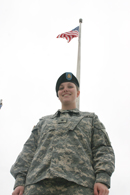Washburn student to be deployed to Iraq
February 25, 2008
Susan Evans, a senior biology major, will be deployed to Iraq in April for a year as a lab technician, working specifically in a microbiology lab. She enlisted in the Army days before her high school graduation, attended basic training and then had one year of intense lab technician training, which normally takes two years to complete.
“We went to school eight hours a day for six months,” said Evans. “And then we had the Army on top of that.”
The training gave her an associate’s degree from George Washington University. She is currently attending Washburn for her BS in biology, with minors in chemistry and physics with an emphasis in pre-med. Although she found out in November about her possible deployment, at the time she was not certain when she would be going. Because of some insurance difficulties she decided to enroll for another semester.
“I talked to the teachers ahead of time,” said Evans. “The professors here have been excellent at helping me with all this.”
While in Iraq, Evans will be working with the 345th Combat Support Hospital, or CSH, in a microbiology lab, testing wound and throat swabs of soldiers and civilians in the surrounding area along with other duties. Although she will be more protected than many of the soldiers who are also being deployed, she realizes the dangers and is trained, along with fellow lab technicians, to deal with many hazardous situations.
“We’re a soldier first,” said Evans. “We have to know how to be able to protect ourselves and our comrades.”
A threat Evans may face is IEDs, or improvised explosive devices. Terrorists hide them along the side of the road, then wait for a convoy to come by and detonate the IED, which can be made from a wide variety of materials.
Through all the risks that are attached to being deployed to Iraq, Evans is still enthusiastic about what she does.
“It is a way of life,” said Evans. “I am very proud to serve my country.”
According to Evans, the war in Iraq is portrayed as something bad when a lot of good has been done, and even though it has been compared to the Vietnam War the two are not comparable.
“We’re not fighting the people of the country,” said Evans. “We’re fighting the 1 to 2 percent of the population who are the Fred Phelps of their religion.”
Evans loves being around her family, and not being able to be with them for a year will be the most difficult part of her deployment. Her mother, Alda Evans, said she will miss her daughter terribly but is comforted by the fact they both have web cams and can write each other letters.
“It’s an adjustment, but I think it will be worth it,” said Alda Evans.
Evans will be back in time for the fall 2009 semester and will continue with her classes. While Evans knows that it all won’t be easy and there will be frustrations along the way, she still enjoys being in the Army and remains optimistic about her upcoming deployment.
“If I can make it through this, I can make it through anything,” said Evans.



